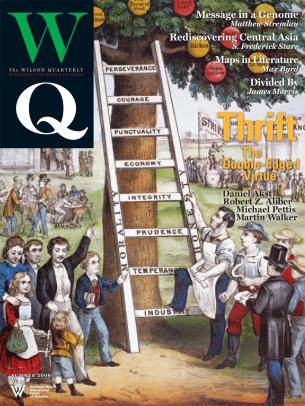Thrift: The Double-Edged Virtue


Is the cost of higher education nearing a tipping point?
Economics, like all sciences, perhaps, aims at the reduction and control of risk. How's that working these days?
Strunk and White may have been influential, but one scholar thinks they based their grammar rules on "intuition and prejudice."
Clamping down on foreign adoptions seems to many African leaders like a relatively cost-free way to stand up to Uncle Sam.
The attacks of 9/11 seem like fanatical acts, but they were meticulously planned for more than five years, with the terrorists training on U.S. soil.
General David Petraeus's views on the importance of higher education don't seem to have penetrated the leadership of the Air Force.
Term limits in Florida and other states were supposed to boost competition, remove the incumbency advantage, and speed up turnover. So far, none of that has come to pass.
A study suggests that all that stimulus money would be better spent on metropolitan areas than given to states.
The average Superfund site costs $43 million to clean up, but the overall economic benefits remain elusive.
Placing even a single superworker among slower ones will boost the speed of the entire group.
With so much of human behavior being linked to human DNA, what's a sociologist to do if everything is inherited?
Think newspapers can only exist online? A study reveals the only three or four percent of newspaper reading happens there.
The newspaper film critic may be well along the path of the ichthyosaurs, soon to be extinct.
The Nazi rise to power in Germany was largely due to voters opting for what they perceived as their economic self-interest.
Ciudad Juárez has a long history of violence between competing drug kingpins.
Venezuelan president Hugo Chávez has attached himself like glue to the nation's secular saint, Simón Bolívar.
Joseph Smith, the 19th-century prophet of the Mormon Church, saw in the story of the Tower of Babel a metaphor for the "infinitie multiplications of opinion" within the Christian world.
Critics say futuristic schemes and rigid insistence on organic methods undermine farmers' efforts to gradually improve agriculture.
In the effort to modernize the medical establishment, there are monumental challenges in installing adaptable systems that will truly improve patient care and cut costs.
An architecture critic says it's time to call a halt to monumental visitor centers, a "pointless, wasteful building type we'd be well rid of."
A high level of corruption in an oil-producing economy, oddly, can actually lessen the chances of armed conflict.
Bringing high-speed Internet access to the hinterlands has not—so far—paid off huge dividends.
The "special relationship" between the United States and Saudi Arabia died in the ashes of the World Trade Tower and the Pentagon in 2001.
The Soviets mandated health spa retreats for their workers, but never quite understood that sometimes people just want to enjoy a little quality time with their spouse and family.
There are some lessons that never seem to get learned: When you realize you're fighting a lost cause, it's time to quit.
Edward Tenner on the good life.
Nick Schulz on the economy's animal spirits.
G. Pascal Zachary on corruption in Kenya.
Martin Walker on Islam and the modern world.
Steven Lagerfeld on Luther Burbank.
F. S. Naiden on love in ancient Greece.
Samuel Loewenberg on the history of famine.
Grant Alden on the commercial revolution in American music.
Andrew Starner on photography and literature.
Renuka Rayasam on television cooking shows.
John Prados on the KGB in America.
Jeffrey Burton Russell on human perceptions of the divine.
Paul Maliszewski on Henry Ford's lost city.
To imagine Central Asia’s future, we must journey into its remarkable past.
As scientists tease out the human genome's secrets, it's easy to seize on our genetic differences, which are small and often inconclusive. But the surprising ancestral connections that our DNA reveals are the big story in the post-genome world.
Maps are not always works of dutiful representation. Sometimes they are tickets to flights of the imagination.
In a world so saturated in connectivity that every last oddball can find a poll, a pie chart, or an online pal to confirm that he's not alone, there are still some gaps that can't be bridged.
America’s enduring love affair with big spending is fetching up against some unromantic realities. But a lifelong saver assures us that there are worse fates than socking it away for a rainy day.
The global economic crisis has some surprising causes, but who would have guessed that overzealous saving was one of them?
Why are the Chinese such legendary savers? The answers shed light on why that habit is about to change.
An era of debt-fueled consumption has come to an end, and with it the economic culture that created it. If government is going to fill in for consumers, it will need to be smart about how it spends.